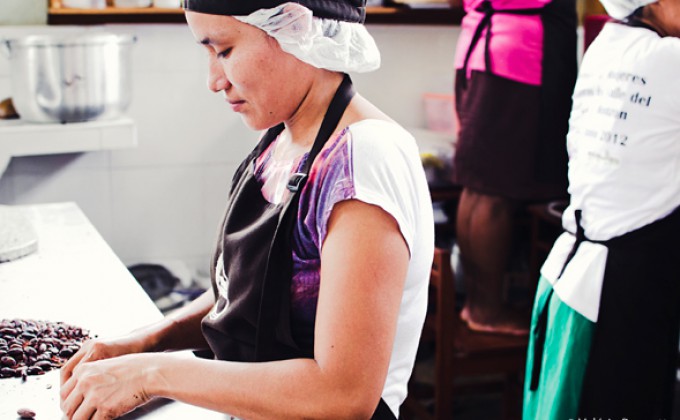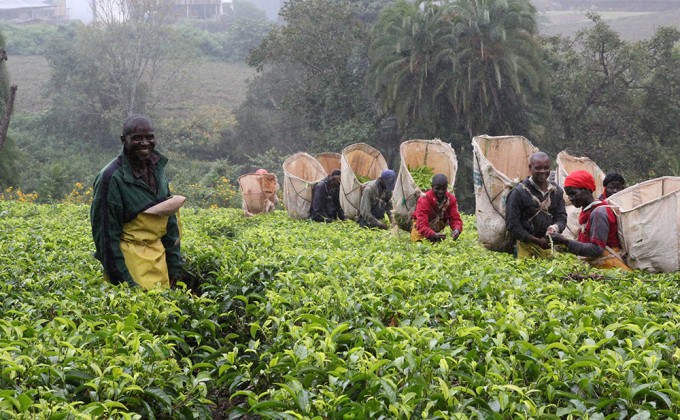


As part of the International Forum held in Montreal last January, CECI and WUSC welcomed Canadian women entrepreneurs from the food industry, all of whom source their products in developing countries. The following question was put to them: How can women transform the food industry for women? Hoping to share their experiences, the women gave their assessment of the situation and brainstormed solutions—ideas to read and share on International Women’s Day.
Each more vibrant than the last, the photos showed Malgasy women at work, sitting on the ground emptying cacao pods or sorting dried cacao beans, the bright red, ripe fruit of coffee trees, and women smiling as they gather tea buds and leaves at a Sri-Lankan plantation, harvest baskets strapped to their backs.
Presented by panelists come to speak about the realities of the lands they know so well, the photos shed light on women’s work in the cultivation and production of cacao, coffee and tea—realities the panelists say are, sadly, all too similar. There was a consensus among the panelists that, while women largely dominate the industries and make invaluable contributions to it, they are as under-recognized as they are underpaid, especially in comparison to men.
SYSTEMIC BARRIERS
“In tea-producing countries such as India, China and Sri Lanka, women make up over 50% of the harvesting work force but less than 20% of non-manual jobs, and even then, these are low-level positions,” explained Shabnam Weber, owner and founder of Tea Emporium, a speciality tea shop that, since the year 2000, has been importing, selling and distributing teas from around the world in Canada.
“Their needs are ignored by men in management, their unionization rates are very low, there is virtually no possibility of promotion, and now their work is under threat by the automation of the industry, so their situation is becoming precarious. On top of that, their work environment is quite macho.” Webner, an entrepreneur from Toronto, admits that even she struggles to be taken seriously by tea producers.
Tracey Clark could not agree more. She is the President and CEO of Bridgehead, a company that sources fair-trade, organic coffee from cooperatives in South America, Central Africa and Indonesia. Speaking out against the “systemic barriers” for women involved in coffee cultivation and production and women’s relegation to low-level roles, she say:
“Land access challenges... (are) a major obstacle, because they lead to to other challenges, such as difficulty gaining access to credit, cooperatives, the market or training.”
In the cacao industry, the situation described by Karine Chrétien Guillemette, owner and founder of Miss Choco, is just as dismal. “Women face tremendous challenges, the first of which is gaining access to land,” explained the Montreal entrepreneur specializing in bean-to-bar chocolate.(1) In West Africa, less than a quarter of women who work in the cacao industry are owners. For women producers, these are major obstacles, because they lead to other challenges, such as difficulty gaining access to credit, cooperatives, the market or training.”
Guillemette says that this, of course, this does not keep women from pulling well over half the weight or from playing a determinant role in the production of quality cacao by taking charge of crucial steps in processing. The number of chocolate makers has risen sharply in the last decade in both the global North and South. But in the developing countries of the South, the status of women always impedes their ability to source directly from male cacao producers, who often don’t take them seriously or treat them with disdain.
NETWORKING
But Guillemette remains optimistic. She believes that the status of women in the cacao industry, and in the food industry in general, will improve when women form a network. “Let’s help connect women so they can become agents of change. Let’s create networks so that women at every level of the chocolate industry can meet and build relationships,” argues Miss Choco, who celebrated the creation of the Women in Cocoa and Chocolate Network in May 2016.
She believes the situation is improving—it is no longer unusual to work with women’s cooperatives, or even mixed cooperatives headed by women. One inspiring example can be found in Peru, where Guillemette went on a mission last summer organized by CECI and WUSC, through the Partnership Brokers component of the Uniterra program. The Pangoa cooperative has had a female executive director for more than 15 years!
Of course, explains Miss Choco, it is important not to exclude men, but to build networks with them to enhance the networks’ influence and longevity.
CONSUMER ACCOUNTABILITY
Shabnam Weber, owner of Tea Emporium, believes that the status of women will improve when each person on the supply chain is held accountable, including consumers.
“It is always so easy to place the blame on someone else. Some are quick to scorn multinational companies that pay little attention to the conditions of tea production, while others blame the small producers who don’t do enough, and still others point to buyers and importers, who keep prices as low as possible.In reality, we are all responsible, and change will not come from a single link on the chain.” Weber believes that raising prices and improving working and living conditions will benefit everyone, including women.
An entrepreneur from Toronto, Weber sits on the board of the Tea and Herbal Association of Canada. She believes strongly in holding consumers accountable. “When you buy a pack of 100 tea bags for less than four dollars, you have to wonder what kind of wages the workers at the other end of the supply chain are earning. We need to raise awareness among consumers who, even if they doubt it at times, do have the power to put pressure on the distribution and supply system by demanding fairer prices and a more equitable approach toward women. But they have to be ready to pay more. Otherwise, nothing will change.”
(1) Bean-to-bar is the process by which chocolate makers purchase cacao beans directly and are involved in every step of processing, up to the final product.
WUSC and CECI's International Forum is an exciting annual gathering where the best ideas and practices for international development are shared. The event is undertaken with the financial support of the Government of Canada through Global Affairs Canada.
Third photo from left to right: Karine Chrétien Guillemette, Owner - Founder, Miss Choco Inc.; Tracey Clark, President & CEO, Brideghead Coffee; Shabnam Weber, Founder & Owner, The Tea Emporium Inc.